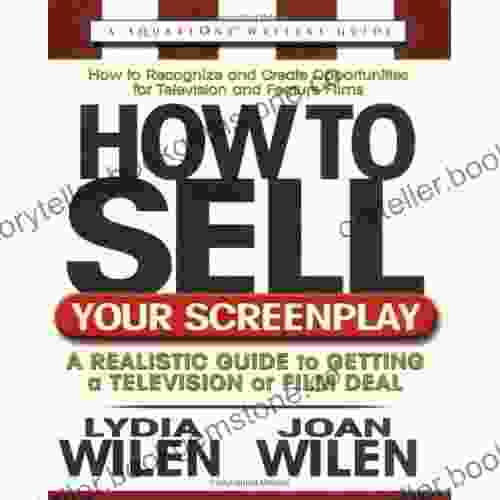A Realistic Guide to Getting a Television or Film Deal: Square One for Screenwriters

Are you an aspiring screenwriter with a burning passion to bring your stories to life on the big or small screen? If so, you're not alone. Thousands of talented writers dream of landing a coveted television or film deal, but only a select few ever achieve this elusive goal.
4.2 out of 5
| Language | : | English |
| File size | : | 2755 KB |
| Text-to-Speech | : | Enabled |
| Screen Reader | : | Supported |
| Enhanced typesetting | : | Enabled |
| Word Wise | : | Enabled |
| Print length | : | 322 pages |
The entertainment industry is notoriously competitive, and the odds of success are often stacked against newcomers. However, by following a strategic and well-informed approach, you can significantly increase your chances of getting your foot in the door and eventually landing a deal for your project.
This comprehensive guide will provide you with all the essential information you need to navigate the complex world of television and film production, from developing a winning concept to pitching and selling your project. By following the steps outlined in this guide, you will be well-equipped to succeed in this challenging but rewarding industry.
Chapter 1: Developing a Winning Concept
The foundation of any successful television show or film lies in a compelling concept. This is the core idea that will drive your story and ultimately resonate with audiences. Developing a winning concept is a multifaceted process that requires creativity, market research, and strategic thinking.
Here are some tips for developing a winning concept:
- Start with a strong premise. The premise is the fundamental conflict or problem that drives your story. It should be something that is relatable, intriguing, and has the potential to sustain a multi-episode or feature-length narrative.
- Create memorable characters. Your characters are the heart and soul of your story. They should be well-developed, relatable, and have clear motivations. Your audience should be able to connect with your characters on an emotional level and root for them to overcome their challenges.
- Develop a unique world. The world in which your story takes place is just as important as the characters themselves. It should be visually appealing, emotionally resonant, and provide a rich backdrop for your characters to interact.
- Find the right genre. The genre of your project will determine its tone, style, and target audience. It is important to choose a genre that you are passionate about and that you believe will appeal to a wide range of viewers.
Chapter 2: Writing a Screenplay
Once you have a winning concept, it is time to start writing your screenplay. This is a critical step in the development process, as it is the roadmap that will guide your project through production. A well-written screenplay will make your project more attractive to potential buyers and help you to secure a deal.
Here are some tips for writing a successful screenplay:
- Use proper formatting. Screenplays have a specific format that you must adhere to. This includes using Courier font, 12-point type, and 1-inch margins. You can find more detailed information on screenplay formatting online.
- Write a strong logline. The logline is a one-sentence summary of your screenplay. It should be concise, intriguing, and accurately reflect the core conflict of your story.
- Develop a compelling story structure. The structure of your screenplay is essential for keeping your audience engaged. It should have a clear beginning, middle, and end, and it should build to a satisfying climax.
- Write dialogue that is natural and believable. The dialogue in your screenplay should sound like real people talking. It should be clear, concise, and engaging.
Chapter 3: Pitching Your Project
Once you have a finished screenplay, it is time to start pitching it to potential buyers. This is the process of presenting your project to executives in the hope of securing a deal. Pitching can be a daunting task, but it is essential for getting your project noticed.
Here are some tips for pitching your project:
- Prepare a strong pitch. Your pitch should be short, concise, and attention-grabbing. It should highlight the unique aspects of your project and why it would be a great fit for their network or studio.
- Know your audience. Research the executives you will be pitching to and tailor your pitch accordingly. Learn about their interests, their past projects, and the types of shows or films they are looking to develop.
- Be confident and enthusiastic. When you are pitching your project, it is important to exude confidence and enthusiasm. This will help to convince the executives that you believe in your project and that you are passionate about bringing it to life.
- Be prepared to answer questions. The executives will likely have questions about your project. Be prepared to answer these questions clearly and concisely. This is your chance to show them that you have a deep understanding of your project and that you are prepared to see it through to completion.
Chapter 4: Negotiating a Deal
If you are fortunate enough to receive multiple offers for your project, you will need to negotiate a deal that is fair and in your best interests. This is a complex process that can be daunting for newcomers, but it is important to approach it with a clear understanding of your goals and priorities.
Here are some tips for negotiating a successful deal:
- Get a lawyer. A lawyer can help you to understand the terms of the deal and ensure that your interests are protected.
- Know your worth. Research the industry standards for writer compensation and make sure that you are being fairly compensated.
- Be prepared to compromise. It is unlikely that you will get everything you want in a deal. Be prepared to compromise on certain points in order to close the deal.
- Don't be afraid to walk away. If you are not satisfied with the terms of the deal, don't be afraid to walk away. There are other opportunities out there, and you should never sign a deal that you are not comfortable with.
Securing a television or film deal is a challenging but ultimately rewarding experience. By following the steps outlined in this guide, you can increase your chances of success and turn your dream of becoming a screenwriter into a reality.
Remember, the entertainment industry is a marathon, not a sprint. It takes time and effort to build a successful career as a screenwriter. Don't get discouraged if you don't achieve overnight success. Keep writing, keep pitching, and keep learning. Eventually, your hard work will pay off.
4.2 out of 5
| Language | : | English |
| File size | : | 2755 KB |
| Text-to-Speech | : | Enabled |
| Screen Reader | : | Supported |
| Enhanced typesetting | : | Enabled |
| Word Wise | : | Enabled |
| Print length | : | 322 pages |
Do you want to contribute by writing guest posts on this blog?
Please contact us and send us a resume of previous articles that you have written.
 Best Book
Best Book Page Flip
Page Flip Bookshelf
Bookshelf Literary loom
Literary loom Chapter
Chapter Bookish
Bookish PageTurner
PageTurner Bibliophile
Bibliophile Story
Story Inkwell
Inkwell Bookworm
Bookworm Labyrinth
Labyrinth Plot Twist
Plot Twist Prose
Prose Paperback
Paperback Storyteller
Storyteller Sanctuary
Sanctuary Fiction
Fiction Reading
Reading Chronicle
Chronicle Read
Read Kevin Mannens
Kevin Mannens Apsley Cherry Garrard
Apsley Cherry Garrard Annette Gordon Reed
Annette Gordon Reed Julian Stallabrass
Julian Stallabrass Saeed Jones
Saeed Jones Pico Iyer
Pico Iyer Armin Weber
Armin Weber Scott Hughey
Scott Hughey Marina Garone Gravier
Marina Garone Gravier Arielle Silverman Ph D
Arielle Silverman Ph D Sonia Misra
Sonia Misra Anthony M Strong
Anthony M Strong Sari Botton
Sari Botton Zharel Anger
Zharel Anger Pamela Des Barres
Pamela Des Barres Cynthia Winton Henry
Cynthia Winton Henry August Wilson
August Wilson Robert Graysmith
Robert Graysmith Anton Chekhov
Anton Chekhov Ashley Fiolek
Ashley Fiolek Ashley Brantley
Ashley Brantley Michael Betancourt
Michael Betancourt Keller Easterling
Keller Easterling Kim Knox
Kim Knox Rebecca Serle
Rebecca Serle Haben Girma
Haben Girma Annette Freeman
Annette Freeman Tracy Franz
Tracy Franz Carl Stubblefield
Carl Stubblefield Elizabeth David
Elizabeth David Linda Nagata
Linda Nagata Fig Taylor
Fig Taylor Eugenio Barba
Eugenio Barba Oliver Mayes
Oliver Mayes R G Collingwood
R G Collingwood Annie Keary
Annie Keary S H Jucha
S H Jucha John Woolf
John Woolf Patrick Rothfuss
Patrick Rothfuss Anne Manera
Anne Manera Asaf Messerer
Asaf Messerer Doris Marjorie Moore
Doris Marjorie Moore Elizabeth Bard
Elizabeth Bard Charles Taliaferro
Charles Taliaferro Jason Louis
Jason Louis Pamela Cutter
Pamela Cutter Anton Treuer
Anton Treuer Sue Miller
Sue Miller Annette Dozier
Annette Dozier Jasper T Scott
Jasper T Scott Jennifer Homans
Jennifer Homans Michael Evamy
Michael Evamy Arthur H Buckley
Arthur H Buckley Ruth Wariner
Ruth Wariner James D Umbach
James D Umbach Linda Furiya
Linda Furiya Atsons
Atsons Suzanne Fredericq
Suzanne Fredericq Stewart James
Stewart James Mary Maccracken
Mary Maccracken Anne Rice
Anne Rice Asali Solomon
Asali Solomon New Edition Kindle Edition
New Edition Kindle Edition Jan Cohen Cruz
Jan Cohen Cruz John Scarne
John Scarne Kyunghee Pyun
Kyunghee Pyun Michael Fleishman
Michael Fleishman Jane Yolen
Jane Yolen Anthony Ryan
Anthony Ryan Brendan Edwards
Brendan Edwards Matthew A Goodwin
Matthew A Goodwin Ursa Dax
Ursa Dax Aubrey A Jones
Aubrey A Jones Austin Channing Brown
Austin Channing Brown Kim Erwin
Kim Erwin W A Bentley
W A Bentley Elizabeth Friendship
Elizabeth Friendship Anne De Courcy
Anne De Courcy John Triptych
John Triptych Sarah Vallance
Sarah Vallance Hanife Hassan O Keeffe
Hanife Hassan O Keeffe Sadhna Shanker
Sadhna Shanker Jonathan Strahan
Jonathan Strahan Edgar Degas
Edgar Degas Eric Warren
Eric Warren Laurel Ann Francis
Laurel Ann Francis Vanessa Hua
Vanessa Hua Wakefield Poole
Wakefield Poole Bernadette Murphy
Bernadette Murphy Peter James West
Peter James West Robert Beverly Hale
Robert Beverly Hale Charles Nordhoff
Charles Nordhoff George Rathmell
George Rathmell Nora Roberts
Nora Roberts Arleta Pech
Arleta Pech Nathan Deuel
Nathan Deuel Mark Edward Harris
Mark Edward Harris Beverly Galeskas
Beverly Galeskas David Deal
David Deal Karen Ordahl Kupperman
Karen Ordahl Kupperman David Larocca
David Larocca Olive Collins
Olive Collins Miss Jenesequa
Miss Jenesequa Nnedi Okorafor
Nnedi Okorafor Michael Jan Friedman
Michael Jan Friedman Ar Corbin
Ar Corbin Martin Cruz Smith
Martin Cruz Smith Haruki Murakami
Haruki Murakami Bella Martin
Bella Martin Joe Russo
Joe Russo Jay Caspian Kang
Jay Caspian Kang Steven M Nolt
Steven M Nolt Catherine E Mckinley
Catherine E Mckinley B B Thatcher
B B Thatcher Arthur C Danto
Arthur C Danto Tim Z Hernandez
Tim Z Hernandez Bill White
Bill White Xiaolu Guo
Xiaolu Guo Chris Weyers
Chris Weyers Deborah D Douglas
Deborah D Douglas Matthew Jm Carpenter
Matthew Jm Carpenter Anthony M Amore
Anthony M Amore Arthur Murray
Arthur Murray Myrnoska Scott
Myrnoska Scott Smauggy Universe
Smauggy Universe Ansel Adams
Ansel Adams Fergal Keane
Fergal Keane Anthony Ryder
Anthony Ryder Anne Mccaffrey
Anne Mccaffrey Shugri Said Salh
Shugri Said Salh Karl Ove Knausgaard
Karl Ove Knausgaard Artemisia Gentileschi
Artemisia Gentileschi Pankaj Mishra
Pankaj Mishra Art Wolfe
Art Wolfe Martin Kemp
Martin Kemp Ariel Dorfman
Ariel Dorfman Doug Peterson
Doug Peterson Tony Peak
Tony Peak Anthony Slide
Anthony Slide Anne Sebba
Anne Sebba Karen A Romanko
Karen A Romanko Yuk Hui
Yuk Hui Arthur Miller
Arthur Miller Lutishia Lovely
Lutishia Lovely Angela Y Davis
Angela Y Davis George Bird Grinnell
George Bird Grinnell Antony Kamm
Antony Kamm Michael Tucker
Michael Tucker Jeffrey Vonk
Jeffrey Vonk Margaret Walker
Margaret Walker D Levesque
D Levesque Heather Vogel Frederick
Heather Vogel Frederick Jun Maeda
Jun Maeda Bob Mayer
Bob Mayer Chawadee Nualkhair
Chawadee Nualkhair Julie Nelson Davis
Julie Nelson Davis Gloria Mattioni
Gloria Mattioni Graham Fraser
Graham Fraser Aziz Shihab
Aziz Shihab Katja Pantzar
Katja Pantzar Doug Scott
Doug Scott Jan Morris
Jan Morris Tiffany Roberts
Tiffany Roberts Carne Griffiths
Carne Griffiths Ashley Bristowe
Ashley Bristowe Anthony David
Anthony David Lonely Planet
Lonely Planet Anton Hager
Anton Hager Richard Killeen
Richard Killeen Asimina Nteliou
Asimina Nteliou Anne Richardson Williams
Anne Richardson Williams Blackhorse Mitchell
Blackhorse Mitchell Arlo Adams
Arlo Adams Sara Paretsky
Sara Paretsky Sheila O Flanagan
Sheila O Flanagan Chris Cozen
Chris Cozen B Ruby Rich
B Ruby Rich Karen Mccartney
Karen Mccartney Meyer Berger
Meyer Berger Lydia Wilen
Lydia Wilen Colin Angus
Colin Angus Ashlee Vance
Ashlee Vance Donald Murray
Donald Murray Ayn Rand
Ayn Rand Scott Westerfeld
Scott Westerfeld Beth Haslam
Beth Haslam Ashley Mahlberg
Ashley Mahlberg Valerie Biden Owens
Valerie Biden Owens Gina Rossi Armfield
Gina Rossi Armfield Antoinette Nora Claypoole
Antoinette Nora Claypoole Kristen Ashley
Kristen Ashley Anne Keenan Higgins
Anne Keenan Higgins Nick Cole
Nick Cole R A Lafferty
R A Lafferty Paul Brinkley Rogers
Paul Brinkley Rogers Pearl Howie
Pearl Howie Edgar Rice Burroughs
Edgar Rice Burroughs Destiny Davis
Destiny Davis Scott M Madden
Scott M Madden Hannah Arendt
Hannah Arendt Beata Lubas
Beata Lubas Ava Archer
Ava Archer Avanti Centrae
Avanti Centrae Eric Campbell
Eric Campbell David E Stannard
David E Stannard Franklin Horton
Franklin Horton Billy Connolly
Billy Connolly Anne Moody
Anne Moody Jacqueline Rayner
Jacqueline Rayner Binka Le Breton
Binka Le Breton John Izbicki
John Izbicki Kris Jenner
Kris Jenner Christopher Simmons
Christopher Simmons Maureen T Corrigan
Maureen T Corrigan Anthony C Winkler
Anthony C Winkler Betty Reynolds
Betty Reynolds Yasmin Angoe
Yasmin Angoe Michael Chatfield
Michael Chatfield Kao Kalia Yang
Kao Kalia Yang Christine Denniston
Christine Denniston Anwei Skinsnes Law
Anwei Skinsnes Law Claire Devarrieux
Claire Devarrieux Lorna Luft
Lorna Luft Prenisha Aja
Prenisha Aja Jt Sawyer
Jt Sawyer Jose Antonio Salgado Alonso
Jose Antonio Salgado Alonso Mark Baskinger
Mark Baskinger Jesse Martin
Jesse Martin M N Forgy
M N Forgy Joseph Mcbride
Joseph Mcbride Davida Schulman
Davida Schulman Nicole Casey
Nicole Casey Blaze Ward
Blaze Ward Scott Lerman
Scott Lerman Ashley K Stoyanov Ojeda
Ashley K Stoyanov Ojeda S C Jensen
S C Jensen Mary Kay Ricks
Mary Kay Ricks Vladimir London
Vladimir London Stephen Moss
Stephen Moss Tamron Hall
Tamron Hall Anne Hillerman
Anne Hillerman Geoff Schumacher
Geoff Schumacher Jason Frye
Jason Frye Talia Beckett
Talia Beckett Barbara Demarco Barrett
Barbara Demarco Barrett Joan Bess
Joan Bess George Huppert
George Huppert Berlitz Publishing
Berlitz Publishing Dirk Hayhurst
Dirk Hayhurst Antonis Tsagaris
Antonis Tsagaris Rebecca Kaye
Rebecca Kaye James Maskalyk
James Maskalyk Robert Dugoni
Robert Dugoni Nancy Lee Mccaskill
Nancy Lee Mccaskill Stephan Talty
Stephan Talty Christopher Griffin
Christopher Griffin Wade Motawi
Wade Motawi Michael Frank
Michael Frank Marta Mcdowell
Marta Mcdowell Frank Conroy
Frank Conroy Joan Tollifson
Joan Tollifson Elena M Watson
Elena M Watson Joan Baxter
Joan Baxter W Michael Blumenthal
W Michael Blumenthal Kaitlyn Greenidge
Kaitlyn Greenidge B V Larson
B V Larson Jane Monteith
Jane Monteith H Dolmetsch
H Dolmetsch T R Todd
T R Todd Michael Kimmelman
Michael Kimmelman Tia Williams
Tia Williams Maxine Leeds Craig
Maxine Leeds Craig Ariana Godoy
Ariana Godoy Jason Waguespack
Jason Waguespack Zalmay Khalilzad
Zalmay Khalilzad Nicholas Sansbury Smith
Nicholas Sansbury Smith Maria Venegas
Maria Venegas John H Groberg
John H Groberg Dave Bartell
Dave Bartell Paul Holt
Paul Holt Koji A Dae
Koji A Dae Anne Lister
Anne Lister Bear Heart
Bear Heart Annie Ernaux
Annie Ernaux Robert V Camuto
Robert V Camuto Antonia Fraser
Antonia Fraser John A Crespi
John A Crespi Detlev Henschel
Detlev Henschel Kalyn Franke
Kalyn Franke Ashley Antoinette
Ashley Antoinette Chloe Fox
Chloe Fox Jaime Castle
Jaime Castle Ray Bradbury
Ray Bradbury Lou Sutton
Lou Sutton Brian Butko
Brian Butko Caroline Montague
Caroline Montague Margaret Scott
Margaret Scott Steven Bradley
Steven Bradley Tay Mo Nae
Tay Mo Nae Darby English
Darby English Anthony Jones
Anthony Jones Lian Hearn
Lian Hearn Morgan Rogers
Morgan Rogers Arthur Bartow
Arthur Bartow Tony Hillerman
Tony Hillerman Kirsten Anderson
Kirsten Anderson John H Clark Iii
John H Clark Iii Peter Turchi
Peter Turchi Janet Farnsworth
Janet Farnsworth Jane Sullivan
Jane Sullivan Owen Jones
Owen Jones Ken Seeroi
Ken Seeroi Ernst Lehner
Ernst Lehner Mimi Kwa
Mimi Kwa Lorraine Caputo
Lorraine Caputo King Ellie
King Ellie Juliette Sobanet
Juliette Sobanet Armine Von Tempski
Armine Von Tempski Walt Bachman
Walt Bachman Clare Therese Gray
Clare Therese Gray Francesca Fiorani
Francesca Fiorani Brian W Smith
Brian W Smith Quentin Tarantino
Quentin Tarantino Chris Saper
Chris Saper Annemieke Mein
Annemieke Mein Emma Read
Emma Read Rebecca Keegan
Rebecca Keegan Arrigo Cipriani
Arrigo Cipriani Anton Roux
Anton Roux Ashley Jaquavis
Ashley Jaquavis Woody Allen
Woody Allen Sarah Winnemucca Hopkins
Sarah Winnemucca Hopkins Anne Frank
Anne Frank Fifi O Neill
Fifi O Neill Waldo Rodriguez
Waldo Rodriguez Ron Stocke
Ron Stocke Arielle Eckstut
Arielle Eckstut Erin Eitter Kono
Erin Eitter Kono Mackinley Helm
Mackinley Helm Howard Dully
Howard Dully Sarah Crafts
Sarah Crafts Rosemary Sullivan
Rosemary Sullivan Pat Cadigan
Pat Cadigan Patricia Williams
Patricia Williams Deborah Paris
Deborah Paris Anton Tekshin
Anton Tekshin Tara Wells
Tara Wells Samantha Hahn
Samantha Hahn Cathy Curtis
Cathy Curtis Peter F Hamilton
Peter F Hamilton Joseph Birchall
Joseph Birchall Noy
Noy Annemarie Bean
Annemarie Bean Christopher Sieving
Christopher Sieving Axel Hacke
Axel Hacke Anne Morrow Lindbergh
Anne Morrow Lindbergh Kathy Kolbe
Kathy Kolbe Gail Morin
Gail Morin Laurence Oliphant
Laurence Oliphant De Andrea
De Andrea Jean Guerrero
Jean Guerrero Peter Jazwinski
Peter Jazwinski Ari Seth Cohen
Ari Seth Cohen Arnold Rampersad
Arnold Rampersad Satyajit Ray
Satyajit Ray Bwwm Love
Bwwm Love N L Hudson
N L Hudson John Davidson
John Davidson Arne Dehli
Arne Dehli Jodi Ohl
Jodi Ohl Benjamin Percy
Benjamin Percy Madeleine Walker
Madeleine Walker Gayatri Gopinath
Gayatri Gopinath Colby Buzzell
Colby Buzzell Valerie Mckeehan
Valerie Mckeehan Robert D Kaplan
Robert D Kaplan Elise Darcy
Elise Darcy Chris A Norton
Chris A Norton Regina Held
Regina Held Vernor Vinge
Vernor Vinge Debbie Macomber
Debbie Macomber Zeneba Bowers
Zeneba Bowers Pat Hall
Pat Hall Shami Stovall
Shami Stovall Dennic Chunman Lo
Dennic Chunman Lo Mary Ann Scott
Mary Ann Scott Annette Kowalski
Annette Kowalski Shonda Buchanan
Shonda Buchanan Mary Renault
Mary Renault Marlene Wagman Geller
Marlene Wagman Geller Jay Allan
Jay Allan Avery Blake
Avery Blake Eric Broudy
Eric Broudy Rivers Solomon
Rivers Solomon Clive Hallett
Clive Hallett Tony Randgaard
Tony Randgaard Lena Grey
Lena Grey Tracy Birdsall
Tracy Birdsall Riva Lehrer
Riva Lehrer Luke Nguyen
Luke Nguyen Joseph Wambaugh
Joseph Wambaugh Br Kingsolver
Br Kingsolver James Rosone
James Rosone Anthony J Melchiorri
Anthony J Melchiorri Carolyn Jenkins
Carolyn Jenkins Anne Green Gilbert
Anne Green Gilbert Laura Davis Chanin
Laura Davis Chanin J R Osborn
J R Osborn Magi Nams
Magi Nams Tim Gunn
Tim Gunn Jan Murphy
Jan Murphy Richard Pikesley
Richard Pikesley Gene D Phillips
Gene D Phillips Tim Downs
Tim Downs Avery Grey
Avery Grey Annette Insdorf
Annette Insdorf Peter Watts
Peter Watts Thomas M Hill
Thomas M Hill John E Siers
John E Siers Diana Kupershmit
Diana Kupershmit Edward Achorn
Edward Achorn Jim Steinmeyer
Jim Steinmeyer Paul Steinberg
Paul Steinberg Arthur Conan Doyle
Arthur Conan Doyle Kindle Edition
Kindle Edition Leokadia Schmidt
Leokadia Schmidt Tamar Diana Wilson
Tamar Diana Wilson Jay Boyce
Jay Boyce Joe Abercrombie
Joe Abercrombie Annemarie Strehl
Annemarie Strehl Phil Doran
Phil Doran David Consuegra
David Consuegra Howling Moon Books
Howling Moon Books Lizzie Williams
Lizzie Williams Anthea Sharp
Anthea Sharp Robert J Serling
Robert J Serling Todd Barry
Todd Barry Eileen Mcnamara
Eileen Mcnamara Nancy Nicholson
Nancy Nicholson Oscar Zeta Acosta
Oscar Zeta Acosta Obed Silva
Obed Silva Austin Howe
Austin Howe Approach Guides
Approach Guides Ashleynicole
Ashleynicole Anthony James
Anthony James Rob Schmitz
Rob Schmitz B Russell Mcconkie
B Russell Mcconkie Colonial Williamsburg Foundation
Colonial Williamsburg Foundation Wesley B Turner
Wesley B Turner Arthur C Clarke
Arthur C Clarke Philip Tyler
Philip Tyler
Light bulbAdvertise smarter! Our strategic ad space ensures maximum exposure. Reserve your spot today!

 Ralph Waldo EmersonPassage to Freedom: A Comprehensive Guide to Washington State's Assistance...
Ralph Waldo EmersonPassage to Freedom: A Comprehensive Guide to Washington State's Assistance... Amir SimmonsFollow ·7k
Amir SimmonsFollow ·7k E.M. ForsterFollow ·5k
E.M. ForsterFollow ·5k Fred FosterFollow ·11.7k
Fred FosterFollow ·11.7k Simon MitchellFollow ·6.1k
Simon MitchellFollow ·6.1k Edison MitchellFollow ·19.8k
Edison MitchellFollow ·19.8k Oliver FosterFollow ·8.1k
Oliver FosterFollow ·8.1k Andrew BellFollow ·7.7k
Andrew BellFollow ·7.7k Wesley ReedFollow ·13.7k
Wesley ReedFollow ·13.7k

 Braden Ward
Braden WardMade to Order Robots and the Coming Revolution
Robots are becoming increasingly common...

 Clay Powell
Clay Powell1971: A Year in the Life of Color
The year 1971 was a pivotal one for color....

 Ralph Waldo Emerson
Ralph Waldo EmersonTech World's Undying Mercenaries: A Deep Dive into the...
In the ever-evolving landscape of the...

 Wade Cox
Wade CoxThe Ultimate Traveler's Guide to the People, Places, and...
Travel has always been a part of the human...

 Evan Simmons
Evan SimmonsA Comprehensive Guide: Uncovering Small Town Culinary...
: A Culinary Odyssey Beyond the City...
4.2 out of 5
| Language | : | English |
| File size | : | 2755 KB |
| Text-to-Speech | : | Enabled |
| Screen Reader | : | Supported |
| Enhanced typesetting | : | Enabled |
| Word Wise | : | Enabled |
| Print length | : | 322 pages |












